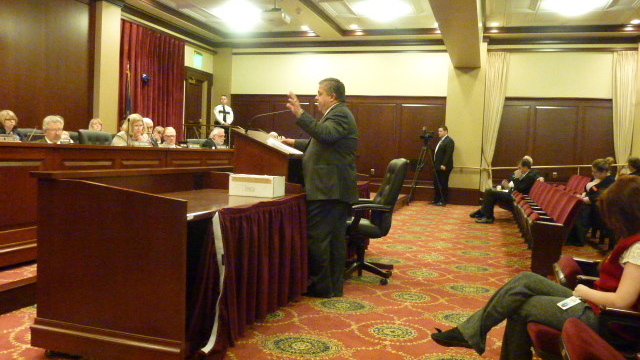
It only took one day for the House and the Senate to push through a bill designed to break the K-12 budget impasse — and bring the 2013 legislative session to a close.
On Wednesday afternoon, the House voted 51-12 to pass Senate Bill 1199, which sets ground rules for spending $21 million on pay for performance and professional development and $3 million for technology pilot programs.
On Wednesday morning, the bill cleared the Senate, 31-3.
The whirlwind day began with a one-hour hearing convened by the House and Senate education committees, where the legislation received unanimous public support from education stakeholders.
Superintendent of Public Instruction Tom Luna, the Idaho Education Association, the Idaho Association of School Administrators, the Idaho School Boards Association and several Idaho educators backed the bill.
On the House and Senate floors, support wasn’t quite unanimous.
In the Senate, Sens. Branden Durst, D-Boise, Bob Nonini, R-Coeur d’Alene, and Steve Vick, R-Dalton Gardens, opposed the plan. House opposition came entirely from Republicans: Vito Barbieri, Dalton Gardens; Lenore Barrett, Challis; Judy Boyle, Midvale; Brent Crane, Nampa; Terry Gestrin, Donnelly; Steven Harris, Meridian; James Holtzclaw, Meridian; Shannon McMillan, Silverton; Jason Monks, Meridian; Joe Palmer, Meridian; Kathleen Sims, Coeur d’Alene; and JoAn Wood, Rigby.
Interestingly, five of these 15 opponents sit on education committees: Durst, Nonini, Boyle, Gestrin and Harris.
The bill, part of budget deal struck Monday evening, was expected to be fast-tracked through the Legislature. Speeding up a normally time-consuming hearing and floor schedule was designed to facilitate adjournment, perhaps by Thursday.
The bill directs state policy for awarding merit pay bonuses and grants for technology pilot programs. The original school budget earmarked money in these two areas, to the consternation of some Senate Republicans. Senate Bill 1199 also gives districts flexibility with discretionary spending if they receive merit pay or technology grants and had previously been directing discretionary money to those areas.
Colleen Johnson, principal of Paul Elementary School, and fifth-grade teacher Ashley Johnson offered support for expanding technology pilot programs. Principal Johnson said her school became an iSchool and has piloted the use of iPad tablets in every classroom. The school also utilizes classroom audio systems, HD televisions, microphones for teachers, wireless networks and Internet filtering systems.
“I have been amazed by the widespread support and acceptance by teachers and parents with the full-school deployment,” Johnson told lawmakers. “Parents who were hesitant have fully embraced this opportunity. I have not had one parent complain or (become) concerned since we deployed the iPads in November.”
One week ago, the session was thrown into a temporary tailspin when the Senate killed the original school budget on a 17-18 vote.
Noting the widespread support in testimony, Luna urged lawmakers to pass SB 1199. He said in the past it has been difficult to build consensus around programs and proposals, and the support should give lawmakers the confidence to push forward.
“Your questions have been asked, and they have been answered (by stakeholders),” Luna said.
SB 1199 is not the only “going-home” bill standing in the path of adjournment. The new Joint Finance-Appropriations Committee 2013-2014 school budget must still clear the House and Senate.
More reading: Check Idaho Education News for a closer look at the 2013-14 budget proposal, and the EDge blog’s analysis of the budget impasse.
